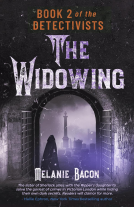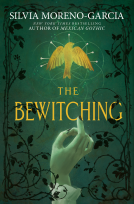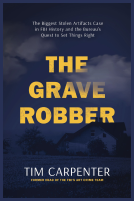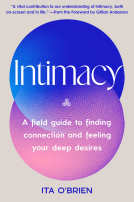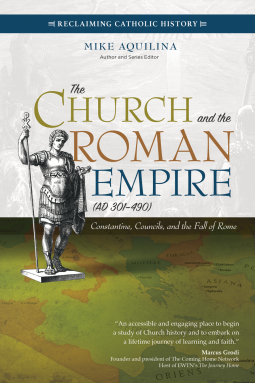
The Church and the Roman Empire (AD 301–490)
Constantine, Councils, and the Fall of Rome
by Mike Aquilina
This title was previously available on NetGalley and is now archived.
Send NetGalley books directly to your Kindle or Kindle app
1
To read on a Kindle or Kindle app, please add kindle@netgalley.com as an approved email address to receive files in your Amazon account. Click here for step-by-step instructions.
2
Also find your Kindle email address within your Amazon account, and enter it here.
Pub Date Sep 13 2019 | Archive Date Jan 12 2021
Talking about this book? Use #TheChurchAndTheRomanEmpireAd301490 #NetGalley. More hashtag tips!
Description
Suspense, politics, sin, death, sex, and redemption: Not the plot of the latest crime novel, but elements of the true history of the Catholic Church.
Larger-than-life saints such as Athanasius of Alexandria, Jerome, Augustine, and political figures such as Emperor Constantine played an important part in the history of the Christianity. In The Church and the Roman Empire (AD 301–490): Constantine, Councils, and the Fall of Rome, popular Catholic author Mike Aquilina gives readers a vivid and engaging account of how Christianity developed and expanded as the Roman Empire declined.
In The Church and the Roman Empire (AD 301–490), Mike Aquilina explores the dramatic backstory of the Council of Nicaea and why Christian unity and belief are still expressed by the Nicene Creed. He also sets the record straight about commonly held misconceptions about the Catholic Church. Readers may be surprised to learn:
• The Edict of Milan didn’t just legalize Christianity; it also established religious tolerance for all faiths for the first time in history.
• The growth of Christianity inspired a more merciful society: Crucifixion was abolished; the practice of throwing prisoners to wild beasts for entertainment was outlawed; and slave owners were punished for killing their slaves.
• Controversy between Arians and Catholics may have resulted in building more hospitals and other networks of charitable assistance to the poor.
• When Rome fell, not many people at the time noticed.
Aquilina brings Church history to life in The Church and the Roman Empire, enabling Catholics to more deeply consider the true origins of the creed that unites us, the Bible we read, and the liturgy we celebrate.
A Note From the Publisher
Aquilina is the author or editor of more than fifty books, including The Fathers of the Church, The Mass of the Early Christians, and Angels of God. He contributed work on early Christianity to the Encyclopedia of Catholic Social Thought. Aquilina has cohosted eleven series on EWTN and hosted two documentaries. Aquilina wrote the companion volumes to the NBC miniseries A.D.: The Bible Continues (2015), and the MGM remake of the movie Ben-Hur (2016). His book A History of the Church in 100 Objects earned an honorable mention in the 2018 Catholic Press Association awards.
He has published hundreds of articles, essays, and reviews in periodicals such as First Things, Crisis, National Catholic Register, The Priest, Columbia, and Our Sunday Visitor. He is a frequent guest on TV and radio, including a weekly appearance on the Son Rise Morning Show.
Aquilina previously served as editor of New Covenant magazine and The Pittsburgh Catholic. He has received honors from the Catholic Press Association, including “Best Magazine” for New Covenant during his editorship.
He lives in the Pittsburgh, Pennsylvania, area with his wife, Terri. They have six children.
Advance Praise
“An accessible and engaging place to begin a study of Church history and to embark on a lifetime journey of learning and faith.”
Marcus Grodi
Founder and president of The Coming Home Network
Host of EWTN’s The Journey Home
“This series is much needed. Every book is crystal clear, engaging, entertaining, and myth-busting. Be prepared to be surprised—and grateful for the wonders the Lord has done.”
Scott Hahn
Founder of the St. Paul Center for Biblical Theology
“A skillfully written, richly informative account of an exciting era in the emergence and development of Catholic Christianity. The story told in this volume is a compelling one, featuring heroic figures such as Emperor Constantine and St. Augustine (along with a villain or two) as well as epochal events such as the Council of Nicaea and the Church’s long struggle against the heresy of Arianism that did so much to shape the faith Catholics now hold.”
Russell Shaw
Author of American Church: The Remarkable Rise, Meteoric Fall, and Uncertain Future of Catholicism in America
“This book debunks myths and presents authentic Catholic history as it should be: bold, engaging, and unequivocally Catholic.”
Steve Weidenkopf
Author of Timeless: A History of the Catholic Church
Available Editions
| EDITION | Paperback |
| ISBN | 9781594717895 |
| PRICE | $17.95 (USD) |
Average rating from 10 members
Featured Reviews
 Janet P, Reviewer
Janet P, Reviewer
A very readable history from shortly before Constantine to shortly after the fall of the Western Empire. The period is important in Church history because so much happened. Because of heretics, dogmas were defined. Because of St. Jerome, the Bible was translated into Latin and it's still used today. Some of our greatest saints lived, preached, and wrote during this period.
Aquilina writes concisely and clearly without neglecting important topics and with an eye for telling detail and a bit of humor. This book, which succeeds in telling this history clearly, is free of charged language and presents a Catholic but fair version of events.
It's an excellent introduction to the period and a fine addition to the series.
 Librarian 431790
Librarian 431790
An interesting book, well written and fascinating.
I think that the last centuries of the Roman Empire are fascinating and this well researched book helped me to discover some new details.
Highly recommended!
Many thanks to the publisher and Netgalley for this ARC, all opinions are mine.
 Ionia F, Reviewer
Ionia F, Reviewer
For being a relatively short book, I was pleasantly surprised by the depth found here. The author made this book enjoyable to read. It is not just another boring history of the church, as so many books are. This one gives you an insider's view on the history of those involved in making decisions for the church, the ensuing differences of opinion and lets you feel like you are part of the action, getting into the heads of the major players.
This book is factual, and yet the author still found a way to make it amusing. It would be good for people just learning the history of the church, but also as entertainment for those who already know the basic facts. I'm always happy when an author finds a way to make history exciting and this book definitely falls into that category.
Recommended.
This review is based on a complimentary copy from the publisher, provided through Netgalley. All opinions are my own.
This book is an easy and entertaining read. It is a great introduction to this period of history. Mike Aquilina expertly weaves together historical stories in an engaging way. It was a hard book to put down, being full of life and action. The Catholic author has clear opinions on many of the events and topics this book covers. In saying this, as a Protestant reader I found this short book interesting and informative.
 Lisa S, Reviewer
Lisa S, Reviewer
This is a simply-written but lively history which dispels many myths about the early Christians, and includes lots of interesting characters and saints, such as Saint Ambrose and Saint Augustine. Aquilina explains the fight between true Christianity and heresies, such as Arianism, and gives a clear account of the several councils. He tells the history as if it is a story, at times, making the different characters have conversations.
One myth concerns transubstantiation. According to Aquilina, the early Christians all believed in the Real Presence, and there were no arguments against it. I found this especially interesting.
This book isn't like a textbook at all, and I will be keen to read the rest of the series, and more about some of the famous Christians mentioned in the book.
I received this free ebook from NetGalley in return for an honest review.
As someone who is a beginner to Church history, this series has been an exciting eye-opener. I’ve often heard of various heresies and subsequent ecumenical councils that were convened to clear them up, but it was difficult to keep all of them straight. “The Church and the Roman Empire” lays everything out in easy to understand language with a dramatic flair. There is nothing dry about this series.
“The Church and the Roman Empire (301–490): Constantine, Councils, and the Fall of Rome” by Mike Aquilina is the 2nd book in the Reclaiming Catholic History series. At least I think it is since chronologically it comes after “The Early Church (33–313): St. Peter, the Apostles, and Martyr.” “The Church and the Roman Empire” was published first, however and is available now!
In “The Church and the Roman Empire” we also meet Constantine and the Roman rulers and Bishops that followed. From the time Christianity was legalized we take many historical twists and turns to the fall of Rome. I enjoyed learning about the personalities of historical figures as well as the ways in which they affected history.
The book moves at a brisk pace which keeps things exciting. Yet the author offers enough information to give us what we need to know. I enjoyed the chronological telling of this series, but the books could certainly be read out of order. They can easily stand alone. Anyone who enjoys history will enjoy “The Church and the Roman Empire.”
Thank you to NetGalley and Ave Maria Press for providing me with ARC of “The Church and the Roman Empire” in exchange for an honest review.”
 Steven M, Reviewer
Steven M, Reviewer
This is the first book published in a new series, Reclaiming Catholic History, though it is the second book in the series. The series is being edited by Mike Aquilina and this first published volume is by him as well. About this series we are told:
“The history of the Catholic Church is often clouded by myth, misinformation, and missing pieces. Today there is a renewed interest in recovering the true history of the Church, correcting the record in the wake of centuries of half-truths and noble lies. Books in the Reclaiming Catholic History series, edited by Mike Aquilina and written by leading authors and historians, bring Church history to life, debunking the myths one era at a time.”
And if the others are nearly as good we are in for 7 excellent volumes. I could hardly put this book down. I spent the better part of 25 years in university, bouncing around schools, and disciplines. I did religious studies courses at both Queen’s University in Kingston, Ontario, and at The University of Waterloo. I graduated with a focus on Roman Catholic Thought. I know this series is being written for a general readership, but I would have loved to have had this book as part of required or recommended reading for a first-year course. The book ends with these words form Mike:
“Since this book is aimed at a nonacademic audience, I’ve tried to keep my citations very simple. The original translations can easily be found at the sites mentioned above. I hope many readers will be inspired to pursue the texts and read the original translations in context.”
But I really believe it would be an excellent course book. But it is written in such a way that any Catholic, any Christian or anyone interested in the history could pick it up and read it with ease. It is not just easy to read it is very engaging. I know much of the history but Aquilina brought it to life in a new way. I was surprised a few times, and laughed more than once.
The sections in the book are:
Introduction
The Underground
The Revolution
Nicaea
The Empire Christianized
Pope Constantius
The Counterrevolution
The Christian Empire and Beyond
A Tale of Two Bishops
An Age of Titans
Decline and Fall
A Lamp in the Twilight
The End
Acknowledgments
Notes
But each chapter also has two extra sections, Up Close and Personal and You Be The Judge. These sections can appear anywhere in the chapter. The first tends to focus on people, and the second on myths or opinions.
The book was educational, entertaining, and very enjoyable. It is one of those books I would love to put in the hands of friends and family. And with Mike as the editor of the series I am sure the subsequent volumes will be just as good. It was a wonderful read, and I am already waiting in eager anticipation for the next volume in the series!



